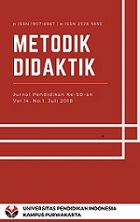KETERAMPILAN RISET MAHASISWA BIOLOGI DAN PENDIDIKAN BIOLOGI; ANALISIS BERDASARKAN REFLEKSI PERSONAL
Abstract
Trough undergraduate research implementation, undegraduate students were practice planning, conducting, and reporting their research in order to complete their study. At all stages of the research, students are usually guided by two lecturer who act as research mentors. The problem that often arise related to the implementation of this research is the length of the completion time of research that exceeds the standards set by the departement. The problem it self potentially critical becouse it’s one of the indicators that determine the value of department accreditation . Considering that, students difficulties identification which was faced in their research needed. Descriptive approach was chosen to conduct this research. Student teacher of biology (n:50) and biology student (n:35) are the subject of this research. Skill questionnaire was developed in order
to collect research skills information based on student personal reflection. It is known that dominantly all the research subject have difficulties in every research stages, and respectively from the highest is conducting stage, reporting stage, and finnaly planning stage. Certainly this results should be considered by the mentors and earlier attention should be given in the planning stage of the research, because if mentors can be ensure that student understand about what they design in the planning stage, difficulties in the following research stages can be avoided.
Full Text:
PDFReferences
Cumming, G. (2013). The New Statistics: Why and How. Psychological Science.20(10), 1-23.
Eagan, M.K, Jr., Hurtado, S., Chang, M.J., Garcia, G.A., Herrera, F.A., & Garibay, J.C.(2013). Making a Difference in Science Education: The Impact of Undergraduate Research Programs. Am Educ Res J. 50(4), 683-713.
Hunter A.B., Laursen, S.L., & Seymour, E. (2007). Becoming a scientist: The Role of Undergraduate Research in Students’ Cognitive, Personal, and Professional Development. Science Education. 91(1), 36-74.
Laursen, S., Seymour, E., Hunter, A.B., Thiry, H., & Melton, G. (2010). Undergraduate Research in The Sciences: Engaging Students in Real Science. SanFransisco: Jossey-Bass.
Linn, M.C., Palmer, E., Baranger, A., Gerard, E., & Stone, E. (2015). Undergraduate Research Experiences: Impacts and Opportunities. Science. 347(6222),
Loannidis, J.P.A., Greenland, S., Hlatky, M.A., Khoury, M.J., Macleod, M.R., Moher, D., Schulz, K.F., & Tibshirani, R. (2014). Increasing Value and Reducing Waste in Research Design, Conduct, and Analysis. The Lancet. 383(9912), 166-175.
Lopatto, D. (2004). Survey of Undegraduate Research Experiences (SURE): First Findings. Cell Biology Education. 3(4), 270-277.
Pascarella, E.T., Pierson, C.T., Wolniak, G.C., Terenzini, P.T. (2004). First-generation College Students: Additional Evidence on College Experiences and Outcomes. Journal of Higher Education. 75(3), 249-284.
Russel, S.H., Hancoc k, M.P., & McCullough, J. (2007). The pipeline: Benefits of Undergraduate Research Experiences. Science. 316(5824), 548-549.
Seymour, E., Hunter, A.B., Laursen, S.L., & DeAntoni, T. (2004). Establishing The Benefits of Research Experiences for Undergraduate in The Sciences: First Finding from A Three Year Study. Science Education. 88(4), 493-534
DOI: https://doi.org/10.17509/md.v9i2.3249



























